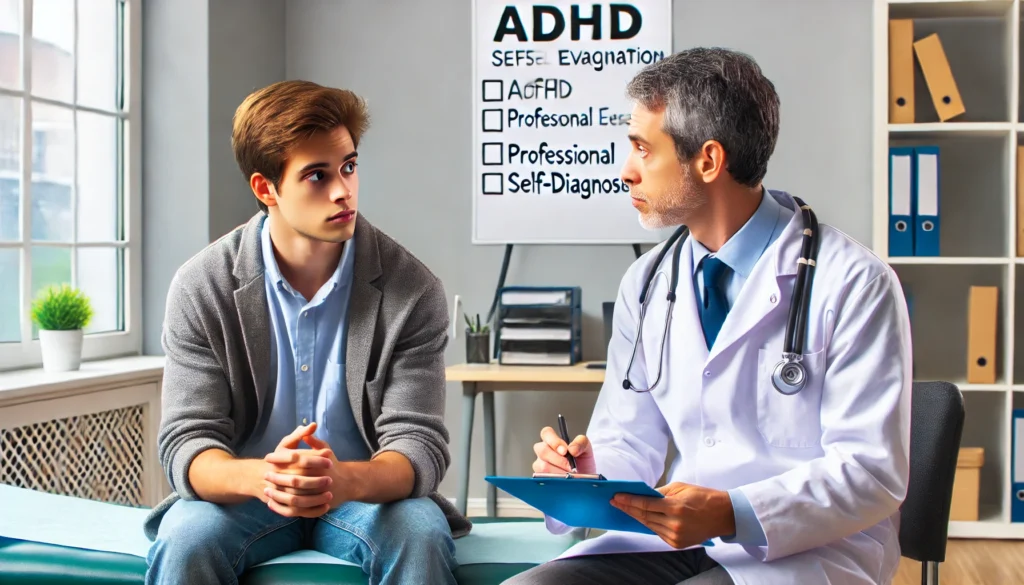In this article, we’ll explore the complexities of ADHD self-diagnosis, examining the symptoms, potential pitfalls, and the importance of professional evaluation. We’ll also delve into the historical context of ADHD, current trends in diagnosis, and what the future might hold for individuals seeking clarity about their mental health.
You may also like: Enhancing Concentration: Strategies for ADHD
Understanding ADHD: A Brief Overview
ADHD is a neurodevelopmental disorder characterized by persistent patterns of inattention, hyperactivity, and impulsivity. It affects both children and adults, with symptoms often manifesting differently across age groups. Historically, ADHD was primarily diagnosed in children, but recent studies have highlighted its prevalence in adults as well.
Symptom Diversity Across Age Groups
The symptoms of ADHD can vary widely depending on age. Children may exhibit more overt hyperactivity, such as an inability to sit still or excessive talking. In contrast, adults might experience more subtle symptoms, such as chronic disorganization or difficulties in maintaining attention during meetings. Understanding these age-related differences is crucial for recognizing ADHD in oneself or others.
Overlapping Symptoms with Other Conditions
It’s important to note that ADHD symptoms can overlap with other mental health conditions, making accurate diagnosis critical. For instance, anxiety and depression can lead to concentration issues similar to those seen in ADHD. Additionally, certain learning disabilities can mimic ADHD symptoms, complicating the diagnostic process further.
The Impact of ADHD on Daily Life
Individuals with ADHD often face challenges in their daily lives, ranging from academic struggles in children to career difficulties in adults. These challenges can affect self-esteem and interpersonal relationships, underscoring the importance of proper diagnosis and management. Recognizing the real-world impact of ADHD symptoms can motivate individuals to seek the necessary support and interventions.
The Rise of Self-Diagnosis: An Emerging Trend
In recent years, there’s been a noticeable increase in individuals exploring self-diagnosis for ADHD. This trend is fueled by a combination of factors, including increased access to information via the internet and a growing awareness of mental health issues.
Accessibility of Information
The internet has democratized access to medical information. Websites, forums, and social media platforms provide a wealth of resources about ADHD symptoms and experiences. Individuals can easily find articles, videos, and personal stories that resonate with their experiences, making self-diagnosis a tempting option. However, the quality and reliability of these sources can vary significantly.
Stigma and Barriers to Professional Help
Despite growing awareness, mental health stigma persists, deterring many from seeking professional help. Some individuals fear judgment from peers or healthcare professionals, while others may face financial or logistical barriers that make accessing professional services difficult. This stigma and the associated barriers can push individuals towards self-diagnosis as a seemingly easier alternative.
Validation of Experiences
For many, self-diagnosis provides a sense of validation. Recognizing one’s symptoms in ADHD descriptions can be a comforting confirmation that they are not alone. This validation can be empowering, helping individuals feel understood and seen. However, it also raises the risk of misdiagnosis if individuals rely solely on self-assessment without professional input.
The Influence of Social Media
Social media platforms have become powerful tools in shaping perceptions of mental health. Influencers and communities dedicated to ADHD awareness can offer support and information, but they can also contribute to misinformation. The viral spread of ADHD-related content can lead individuals to prematurely label themselves without proper evaluation.

The Dangers of Self-Diagnosis
While self-diagnosis can be empowering, it also carries significant risks. Misdiagnosis is a primary concern. ADHD symptoms can mimic or overlap with other conditions, such as anxiety, depression, or learning disabilities. Without professional evaluation, there’s a risk of misunderstanding one’s mental health needs.
Misdiagnosis and Its Consequences
Self-diagnosis can lead to misdiagnosis, where individuals incorrectly identify ADHD as the root of their challenges. This can result in inappropriate or ineffective treatment approaches, potentially exacerbating existing issues. Misdiagnosis can also delay the identification and treatment of the actual underlying condition.
The Psychological Impact of Misdiagnosis
Receiving an incorrect self-diagnosis can have a psychological impact, leading to confusion and frustration. Individuals may feel invalidated if they do not see improvements after self-administered interventions. The emotional toll of navigating mental health challenges without professional guidance can further complicate one’s mental well-being.
Over-Reliance on Self-Diagnosis
Relying solely on self-diagnosis can prevent individuals from seeking comprehensive evaluations that consider their full medical history and symptomatology. This over-reliance may lead to a narrow focus on ADHD, ignoring other possible conditions that could be contributing to their symptoms. It emphasizes the need for a balanced approach that incorporates both self-awareness and professional evaluation.
The Importance of Professional Evaluation
To accurately diagnose ADHD, a comprehensive assessment by a qualified healthcare professional is essential. This process often involves a detailed examination of one’s medical history, symptom analysis, and possibly standardized testing.
Differential Diagnosis
Healthcare professionals are trained to distinguish between ADHD and other conditions with similar symptoms. This ensures that individuals receive the appropriate treatment and support. A differential diagnosis considers various factors, such as the individual’s history, symptom patterns, and potential co-occurring conditions, to provide a holistic understanding of their mental health.
Tailored Treatment Plans
A professional diagnosis can lead to a customized treatment plan, which may include medication, therapy, or lifestyle modifications tailored to the individual’s unique needs. Tailored plans offer a targeted approach to managing ADHD symptoms, addressing both immediate concerns and long-term well-being. The personalized nature of professional care increases the likelihood of successful outcomes.
Access to Resources and Support
A formal diagnosis often provides access to additional resources, such as support groups, educational accommodations, and workplace adjustments. These resources can significantly enhance an individual’s quality of life, offering practical tools and community support. Access to professional networks can also facilitate ongoing care and adaptation to changing needs over time.
Building a Collaborative Care Team
Professional evaluation encourages the development of a collaborative care team, involving healthcare providers, therapists, educators, and family members. This team approach ensures that all aspects of an individual’s life are considered in their treatment plan. Effective collaboration can lead to more comprehensive support and a cohesive strategy for managing ADHD.
Historical Context and Current Trends
ADHD has been recognized in various forms throughout history. Initially termed “hyperkinetic reaction of childhood,” the understanding of this disorder has evolved significantly over the decades. Today, ADHD is recognized as a lifelong condition that affects both children and adults.
Evolving Definitions and Perceptions
The definitions and perceptions of ADHD have shifted over time. Early understandings focused primarily on hyperactivity in children, while contemporary views acknowledge a broader spectrum of symptoms affecting all age groups. This evolution reflects growing awareness and research into neurodevelopmental disorders.
Increased Adult Diagnosis
There’s a growing recognition of ADHD in adults, leading to more diagnoses in this demographic. Adult ADHD is now understood to manifest differently than in childhood, often presenting as issues with time management, organization, and sustained attention. This shift highlights the importance of recognizing and addressing ADHD across the lifespan.
Gender Differences in Diagnosis
Historically, ADHD was considered more prevalent in males. However, recent studies suggest that females are often underdiagnosed, as their symptoms may present differently. Females with ADHD might display less overt hyperactivity and more inattentive symptoms, leading to under-recognition. This gender disparity underscores the need for more inclusive diagnostic criteria.
The Neurodiversity Movement
The neurodiversity movement has gained momentum, advocating for a shift in how society views neurodevelopmental differences like ADHD. This movement emphasizes acceptance and understanding, rather than pathologization. It encourages viewing ADHD as a variation of human experience, promoting strengths-based approaches and reducing stigma.

Future Implications and Considerations
As our understanding of ADHD continues to evolve, so too will the approaches to diagnosis and treatment. The integration of technology in healthcare, such as telemedicine and digital health tools, offers new avenues for assessment and support.
The Role of Technology in Diagnosis
Digital tools, such as apps and online platforms, can provide preliminary assessments and symptom tracking, offering valuable insights for both individuals and healthcare professionals. These tools can enhance traditional diagnostic methods by providing continuous data and facilitating remote monitoring. However, they should complement rather than replace professional evaluations.
The Rise of Telehealth Services
The rise of telehealth has made professional evaluation more accessible, particularly for those in remote areas or with mobility challenges. Telehealth services can offer convenience and flexibility, allowing individuals to connect with specialists without geographical constraints. This increased access can improve early diagnosis and intervention for ADHD.
Ethical Considerations in Digital Health
While technology presents new opportunities, it also raises ethical considerations regarding privacy, data security, and the potential for over-reliance on digital assessments. Ensuring data protection and informed consent is crucial in maintaining trust in digital health solutions. Balancing innovation with ethical responsibility is essential for the effective integration of technology in mental health care.
The Future of ADHD Research
Continued research into ADHD will likely uncover new insights into its causes, manifestations, and treatment options. Advances in neuroscience and genetics may lead to more precise diagnostic tools and targeted therapies. The future of ADHD research holds the promise of improved understanding and better outcomes for individuals with ADHD.

Practical Advice for Those Considering Self-Diagnosis
If you’re contemplating self-diagnosis for ADHD, it’s important to approach the process thoughtfully:
Educate Yourself Thoroughly
Familiarize yourself with the symptoms of ADHD and consider how they relate to your experiences. Seek information from reputable sources, such as academic journals, official health organizations, and expert-authored books. A well-rounded understanding can help you discern whether your symptoms align with ADHD or another condition.
Seek Professional Guidance Early
Use self-assessment as a starting point, but seek a comprehensive evaluation from a healthcare professional. Early professional involvement can prevent misdiagnosis and ensure that you receive appropriate treatment and support. Professionals can provide clarity and guidance, helping you navigate the complexities of ADHD and related conditions.
Stay Open-Minded and Flexible
Be prepared for the possibility that your symptoms may be attributed to another condition. Staying open-minded allows you to adapt to new information and recommendations from healthcare providers. Flexibility in your approach can lead to more effective management of your mental health, regardless of the diagnosis.
Connect with Supportive Communities
Engage with communities and support groups that offer understanding and resources. Connecting with others who share similar experiences can provide emotional support and practical advice. These networks can be valuable allies in your mental health journey, offering encouragement and shared knowledge.
In conclusion, while the allure of self-diagnosis is understandable, it cannot replace the value of professional evaluation and support. ADHD is a complex condition, and understanding it requires a careful and nuanced approach. By combining self-awareness with professional guidance, individuals can navigate their mental health journey with confidence and clarity.
Further Reading:
Is TikTok increasing the number of self-diagnoses of ADHD in young people?
Important Note: The information contained in this article is for general informational purposes only, and should not be construed as health or medical advice, nor is it intended to diagnose, prevent, treat, or cure any disease or health condition. Before embarking on any diet, fitness regimen, or program of nutritional supplementation, it is advisable to consult your healthcare professional in order to determine its safety and probable efficacy in terms of your individual state of health.
Regarding Nutritional Supplements Or Other Non-Prescription Health Products: If any nutritional supplements or other non-prescription health products are mentioned in the foregoing article, any claims or statements made about them have not been evaluated by the U.S. Food and Drug Administration, and such nutritional supplements or other health products are not intended to diagnose, treat, cure, or prevent any disease.


